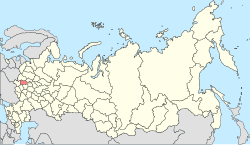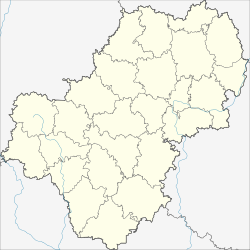Kozelsk
| Kozelsk (English) Козельск (Russian) |
|
|---|---|
| - Town - | |
 Location of Kaluga Oblast in Russia |
|
|
|
|
|
|
|
|
|
|
| Administrative status (as of 2013) | |
| Country | Russia |
| Federal subject | Kaluga Oblast |
| Administrative district | Kozelsky District |
| Administrative center of | Kozelsky District |
| Municipal status (as of October 2013) | |
| Municipal district | Kozelsky Municipal District |
| Urban settlement | Kozelsk Urban Settlement |
| Administrative center of | Kozelsky Municipal District, Kozelsk Urban Settlement |
| Statistics | |
| Population (2010 Census) | 18,245 inhabitants |
| Time zone | MSK (UTC+03:00) |
| First mentioned | 1146 |
| Postal code(s) | 249720, 249722, 249723, 249725, 249739 |
| Dialing code(s) | +7 48442 |
| on | |
Kozelsk (Russian: Козе́льск) is a town and the administrative center of Kozelsky District in Kaluga Oblast, Russia, located on the Zhizdra River (Oka's tributary), 72 kilometers (45 mi) southwest of Kaluga, the administrative center of the oblast. Population: 18,245 (2010 Census);19,907 (2002 Census);19,735 (1989 Census).
It was first mentioned in an 1146 chronicle as a part of Principality of Chernigov. Kozelsk became famous in the spring of 1238, when its seven-year-old prince Vasily, son of Titus, had to defend the town against the army of Batu Khan. The latter dubbed it an "evil town" because its citizens had been fighting the attackers for seven weeks in a row, killing around four thousand enemy soldiers during the siege. The citizens of Kozelsk were greatly outnumbered and almost all of them died in battle.
In 1446, Kozelsk was temporarily under the rule of the Grand Duchy of Lithuania. In 1494, the town was finally annexed by the Grand Duchy of Moscow. In 1607, one of Ivan Bolotnikov's units was located in Kozelsk and showed resistance to the Tsar's army.
The much-venerated monastery, Optina Pustyn, is close by. In the 19th century, this hermitage gained wide renown for its "startsy". After the outbreak of World War II, a POW camp was established in the monastery for Polish officers taken captive by the Red Army during the Polish Defensive War of 1939. Between April and May 1940, the NKVD transferred approximately 5,000 of them to a forest near Katyn, where they were executed in what became known as the Katyn massacre. The remaining two hundred officers were sent to a camp in Pavlishchev Bor and then to Gryazovets. The town was occupied by the German army from October 8, 1941 until December 27, 1941 and was totally destroyed. It was rebuilt after the war.
...
Wikipedia



